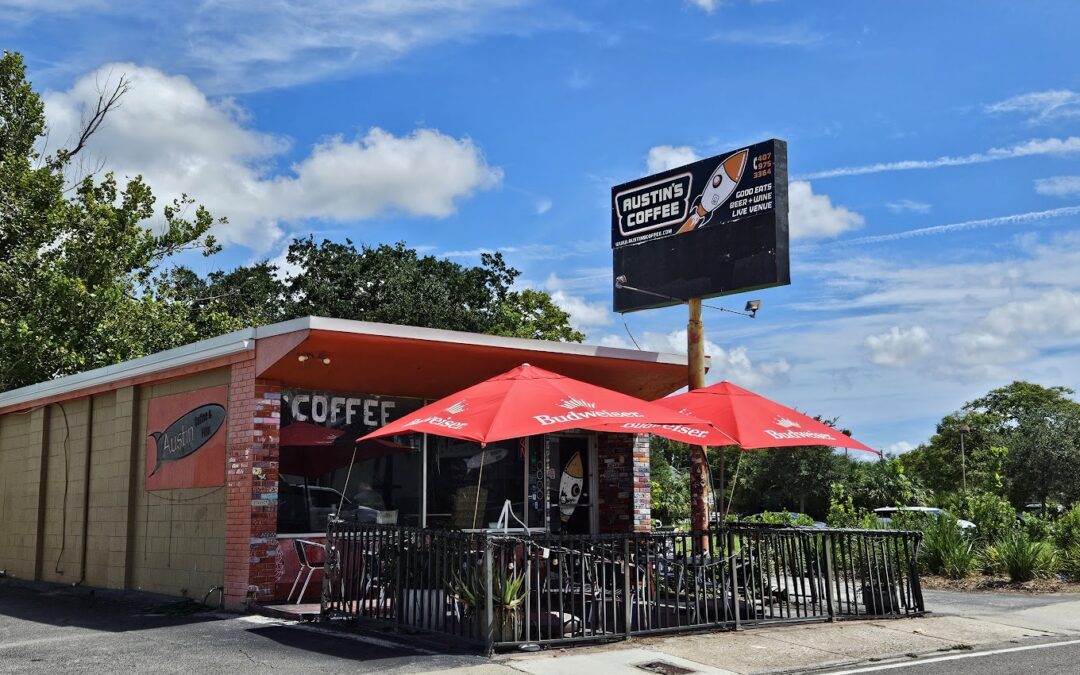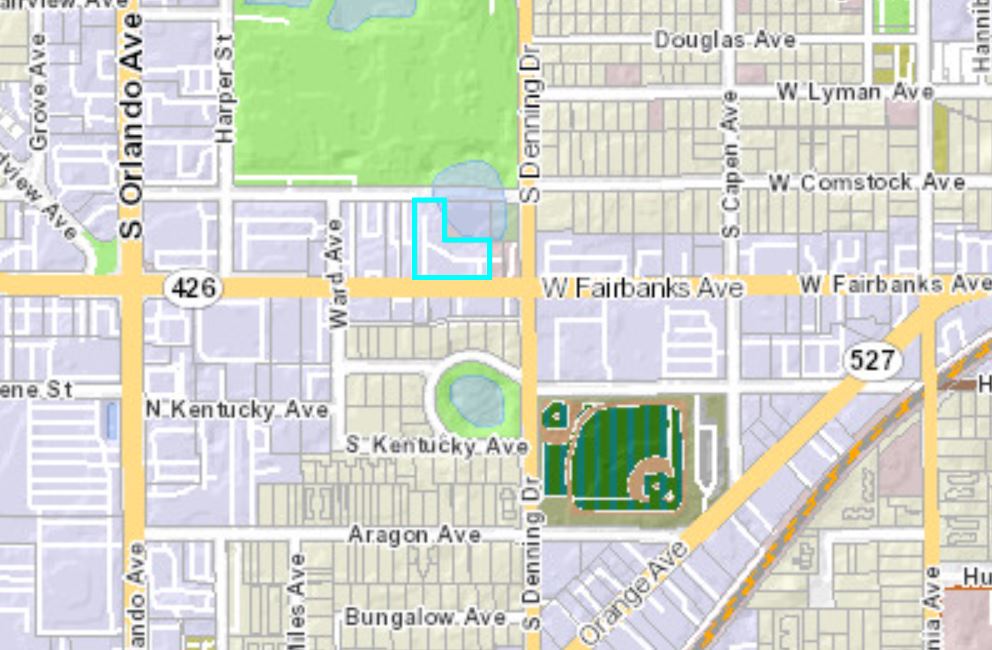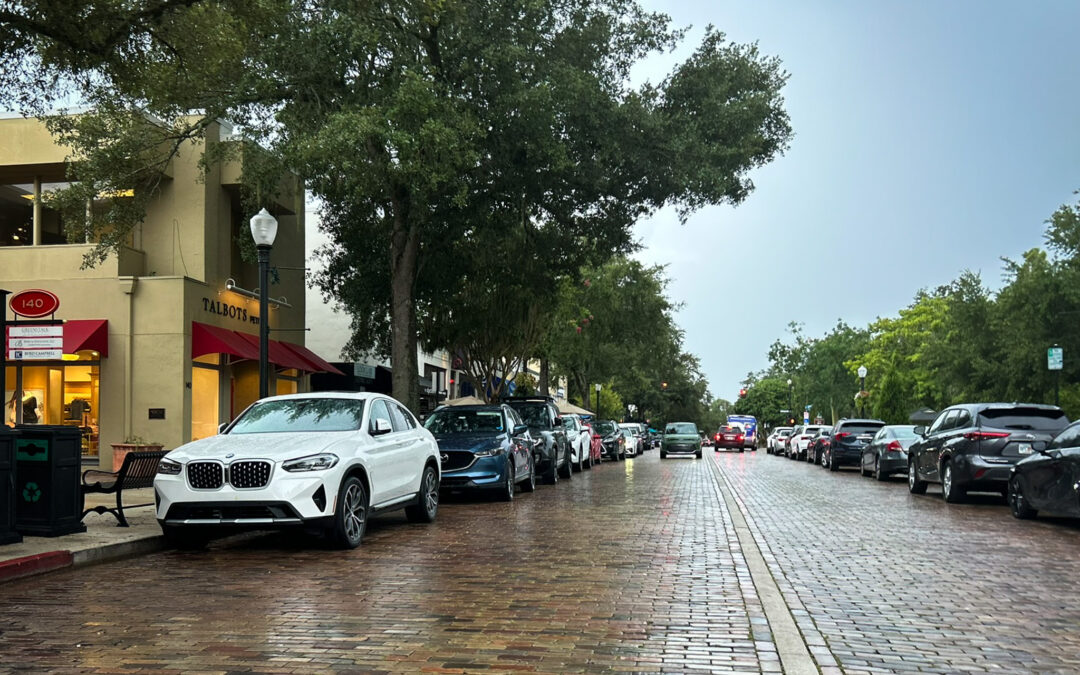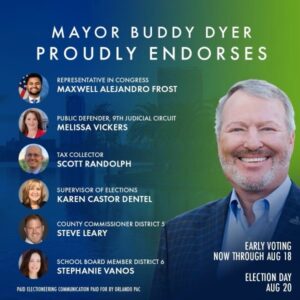
by Beth Kassab | Nov 22, 2024 | City Commission, News, Uncategorized, Zoning and Development
Winter Park Commission to consider how to fix storm flooding
The idea of floating new bonds emerged at a work session last month, but an increase in stormwater fees already in motion may do the trick
Nov. 22, 2024
By Beth Kassab
When commissioners meet next month for their final meeting of the year, they are likely to consider one of the city’s most pressing ongoing problem: how to control flooding highlighted by a series of major storms in recent years.
City staff is finishing recommendations for where to start when it comes to a list of as much as $40 million worth of proposed fixes in Winter Park and, in some cases, extending into neighboring Orlando, Orange County and Seminole County.
Those include running new pipes to connect lakes to better manage heavy downpours, replacing culverts and expanding ditches.
Such projects may not make for the most compelling City Commission debates — they are the kind of thing most residents don’t think about until they can’t drive down a street because of flooding or until they can see lake levels rising and threatening homes and businesses.
But it’s that nitty gritty of local government that has proven crucial to hurricane recovery and quality of life, especially in the wake of Hurricane Ian in 2022 and then Milton and Helene this year.
“There is politics and people can disagree on politics,” said Charles Ramdatt, director of Public Works and Transportation at a City Commission work session last month. “But science is science and what we observe is reality. And there’s no disagreement that we’re getting more frequent storm events. We have more frequent major events as well.”
Specific projects and estimated costs were identified in three studies the city paid for to determine ways to improve how stormwater is stored and managed.
They include $4.6 million to add a pump station and expand Lake Mendsen at MLK Park just outside the Library & Events Center. Surrounding neighborhoods have routinely seen flooding after storms. There’s also the idea of running a pipe (estimated at nearly $600,000) to connect Lake Mendsen to Lake Rose, the former Winter Park sinkhole just a few blocks away at the corner of Fairbanks Avenue and Denning Drive, which is known to flood at times.
Also on the list are about $600,000 worth of improvements to Lake Killarney. And there are multiple proposed lake connection such as from Lake Knowles to Lake Maitland (at $2.2 million) and Lake Grace to Lake Forest and Lake Sue (at more than $2 million).
In some cases, neighboring Orlando or the counties could contribute to the cost of the fixes.
Mayor Sheila DeCiccio said at the recent workshop that she wants to make sure the projects truly make a difference in the places where people have experienced storm flooding.
“I’m very concerned because I’m not sure how these fixes are going to fix the flooding on Morse (Boulevard) or Denning … into streets and homes,” she said. “I don’t know if it’s enough.”
Ramdatt said aging infrastructure is also part of the problem and told commissioners his department will soon have its own diagnostic equipment to help locate leaky underground pipes or other concerns.
“It’s like doing a cardiac cath,” he said, likening the investigations to when a doctor examines heart valves for leaks or blockages and makes fixes to improve the patient’s health and heart efficiency. “So we’re going to do that analysis to understand those and fix those.”
Commissioners also considered how residents will pay for the improvements.
In some cases, the newly expanded Community Redevelopment Agency — which is allowed to hold on to tax dollars that would otherwise go to Orange County — can pay for some projects, particularly on the west side of the city near Fairbanks and Interstate 4 and in the central business corridor.
Some commissioners said they were in favor of also asking voters to approve issuing new bonds to cover the expenses. But there likely wouldn’t be enough time to get the question on the March ballot, when two commission seats are also up for election and voters will decide on whether to keep the ban on gas-powered leaf blowers.
Knight said it’s possible the higher stormwater fees already approved by the commission will be enough to pay for the projects. Residents started paying an extra penny last year and will go up again by a penny next year. Those payments generated $700,000 the first year and an estimated $1.4 million this year.
The fees are calculated on the amount of impervious surface (generally concrete) on a homeowner’s lot at 7 cents per square foot this year.
WinterParkVoiceEditor@gmail.com
To comment or read comments from others, click here →

by Beth Kassab | Nov 14, 2024 | City Commission, News, Uncategorized, Zoning and Development
City to be new landlord for Michelin-star restaurant and Austin's Coffee in $4 million deal
The mayor says leases on the property will be honored, but the city needs the land for drainage and road projects
Nov. 14, 2024
By Beth Kassab
City Commissioners voted unanimously to pay $4 million for an acre of land on the corner of Fairbanks Avenue and Denning Drive that is home to Chef Michael Collantes’ Soseki, which earned a Michelin star in 2022, and longtime community spot Austin’s Coffee.
The vote came after owners of the businesses made pleas for the city to allow them to continue to operate or help them relocate.
Mayor Sheila DeCiccio said the seller of the property approached the city and “if we don’t buy it, it will go to someone else.”
City officials have eyed the land for roughly 20 years as a potential piece needed to widen the busy intersection to improve traffic flow, add stormwater drainage and grow neighboring MLK Park, popular for its playing fields.

Chef Michael Collantes
“In addition to the left turn lanes … there will also be an opportunity to expand the park,” DeCiccio said. “So what I want to make clear is when we purchase this, we are not looking to terminate any leases. We are not looking to buy them out. We are looking to honor the leases there.”
But that promise didn’t alleviate trepidation from Collantes who spoke to the commission and noted the more than $1 million investment he has in the intimate modern omakase-style restaurant. He also has other concepts in the building including Bar Kada, home to a large sake collection, and is set to open Perla’s Pizza Cocktails and more next year. He has lease options on the property that run through 2035.
“We put in quite a big amount of money in infrastructure,” he told commissioners. “I would hate to pick up and move this amazing restaurant and move outside of the city of Winter Park.”
Jackie Moore, co-owner of Austin’s, said her lease is set to expire next year and questioned whether adding left turn lanes would make a noticeable difference for motorists.
“If a turn lane is put in, it would take seconds off, not minutes off,” she said, referencing a conversation she had with officials at the state Department of Transportation. “You would be displacing businesses that have been there for decades.”
She added that the city should compensate the business owners if they are forced to move.
The 1-acre property at 929 W. Fairbanks Avenue is owned by a company managed by Andrew Dubill, a principal in Avanti Properties Group based on nearby Pennsylvania Avenue.
The seller was not at the meeting but City Manager Randy Knight stepped out at one point to phone the property company’s representative after commissioners asked for 75 days rather than 60 days for due diligence before finalizing the deal. The seller agreed to the change.
Commissioners discussed whether they might lower the price they are willing to pay if the due diligence turns up code violations or environmental damage from former businesses that will require costly work.
“We would either have them fix it or reduce the purchase price accordingly and go in and fix it ourselves,” DeCiccio said.
Knight said it could take years before the turn lanes are added or the other projects take place such as the beautification of Lake Rose — now the name of the famous 1981 sinkhole that swallowed a home and at least five Porches at a repair shop.
At least some of the businesses could still operate even if that work is underway, perhaps with a reorienting of the building entrances toward the park. The six leases, which expire between 2025 and 2035, bring in about $180,000 in rent each year.
The city will use $1 million from the parks acquisition fund and $3 million from the newly-expanded Community Redevelopment District to cover the purchase price.
WinterParkVoiceEditor@gmail.com
To comment or read comments from others, click here →

by Beth Kassab | Nov 11, 2024 | City Commission, News, Zoning and Development
City to consider buying Austin's Coffee House to widen road and improve MLK Park
The potential land deal is one in a series of acquisitions to add turn lanes at Fairbanks Avenue and Denning Drive
Nov. 11, 2024
By Beth Kassab
The City Commission this week will consider spending $4 million to purchase the buildings leased by Austin’s Coffee House and neighboring shops to expand the intersection at Fairbanks Avenue and Denning Drive and expand MLK Park.
The 1-acre property at 929 W. Fairbanks Avenue is owned by a company managed by Andrew Dubill, a principal in Avanti Properties Group based on nearby Pennsylvania Avenue.
Winter Park leaders have slowly been acquiring nearby land to improve the busy intersection, including two properties to the east as well as right-of-way from the property owner at the northeast corner of the intersection.
The concept is to construct a left turn lane in both directions on Fairbanks to improve traffic flow, according to a staff report. The nearby park could also see potential improvements with extra land available, including the beautification of Lake Rose — the current moniker for the famous 1981 sinkhole that swallowed a home and at least five Porches at a repair shop.
With the property, would come at least four leases from businesses occupying the storefronts, according the staff report. Those all have expiration dates between 2025 and 2035 and bring in about $180,000 in rent each year.
The city would potentially takeover as landlord while the project planning is underway, a process estimated to take two to three years.
The staff report suggested some of the stores could still operate, perhaps with a reorienting of the building entrances, for a period of time.
City officials would use $1 million from the parks acquisition fund and $3 million from the newly-expanded Community Redevelopment District to cover the purchase price.
WinterParkVoiceEditor@gmail.com
To comment or read comments from others, click here →

by Beth Kassab | Sep 3, 2024 | City Commission, News, Uncategorized, Zoning and Development
Developers could catch a break on parking rules if changes approved
The P&Z board will tonight hold the first hearing on changes designed to avoid large, mostly empty lots
Sept. 3, 2024
By Beth Kassab
Developers could soon face less strict parking requirements in Winter Park if recommended changes are approved to reduce the number of spaces required for shops, offices and apartments.
The Planning & Zoning Board will hear the proposal for the first time on Tuesday night at 6 p.m.
Last year the Winter Park Chamber of Commerce brought in the author of “Paved Paradise: How Parking Explains the World” to advocate for loosening the number of required spaces for new development.
Henry Grabar argues that all over America, cities are underhoused and overparked. Valuable real estate is taken up by too many unused parking spaces. And that, he says, drives up the cost of construction and pushes sprawl.
Onerous parking codes also offer a way for residents to oppose new affordable or denser housing projects.
“Badmouthing the poor was a little unseemly,” he wrote. “But complaining about parking was morally unimpeachable.”
In fact, parking became a focus in the recent debate over Rollins’ proposal to build 30 units that it plans to rent below market rate to its faculty and staff. The City Commission approved the project last week, ultimately, with a compromised parking arrangement and a pledge from Rollins to give over some land for more on-street parking.
The parking standards used in that project are aligned with the proposed changes from city staff.
Among the proposed changes outlined in the memorandum:
- Unify the parking code requirement for non-medical office and retail city-wide to one space per 333 square feet versus the current rule of one space per 250 square feet. According to the staff report, the standard is already one space for 333 square feet in the Central Business District, the Hannibal Square neighborhood and the Orange Avenue Overlay. This is a 25% decrease in parking required for retail or non-medical office.
- Reduce parking at large office buildings, which have the largest parking surpluses, according to the report. Combined with the change above this would further reduce the parking requirements to one space per 400 square feet for any building larger than 15,000 square feet. “For example, a 30,000 square foot office building now needs 120 parking spaces,” the staff report explained. “With the two changes together (1 per 333 for the first 15,000 square feet and 1 per 400 for next 15,000 square feet), the parking required is 83 spaces. This is a 30% reduction in required parking.”
- For apartments of three or more units, the standards would be 1.25 spaces for a one-bedroom unit; 2 spaces for a two-bedroom unit and 2.5 spaces for a three-bedroom unit. This is the same standard that exists now for properties within the Orange Avenue Overlay. For townhouse and condo projects with larger units, the current rule would remain of 2.5 spaces if the unit is larger than 2,000 square feet.
- The maximum parking provision could be no more than 150% of the code requirement.
During the discussion about the Rollins faculty apartments, some commissioners indicated they may not be on board with the changes.
Commissioner Todd Weaver, who voted against the project, said he would “never vote for decreasing parking in our downtown because there’s no mass transit.”
That has been a key criticism of Grabar’s philosophy — that not every city has the local buses, shuttles or other options in place to wean residents off of their dependence on cars.
Winter Park boasts one of the most successful SunRail stops on the commuter rail’s line, but rail system along with the Lynx bus system lack a regional dedicated funding source to keep up with demand.
The city staff report, however, argues there are reasons unrelated to the transportation debate to reduce parking requirements, especially among office buildings.
“Office floor plans have evolved over the years with larger offices, fewer open-air cubicles and more amenity space,” the report said. “Additionally, the nature of most office businesses has changed so that fewer clients need to visit with the use of email and electronic communication. It also is prudent to have a unified city-wide parking rate for office and retail versus different geographic parking rates, thus the proposal for one per 333 square feet city-wide.”
WinterParkVoiceEditor@gmail.com
To comment or read comments from others, click here →

by Beth Kassab | Aug 29, 2024 | Election, News, Uncategorized, Zoning and Development
Steve Leary taps political committee for unlimited dollars in race against Kelly Semrad
Universal Orlando, Tavistock, other land developers wrote big checks in support of the former Winter Park mayor who is facing Semrad in the November election
Aug. 29, 2024
By Beth Kassab
Steve Leary, candidate for Orange County Commission District 5, started a political committee earlier this summer that has allowed him to take uncapped donations from deep-pocketed businesses who often have business in front of the commission such as tourism giant Universal Orlando and Tavistock Development Company.
The committee called Neighbors for a Sensible Orange County brought in $48,000 in July and August, according to the most recent financial filings, and has most of the money left to spend ahead of the general election on Nov. 5 when Leary, a Republican and former Winter Park mayor, faces Kelly Semrad, a Democrat and UCF professor who took first place in the primary on Aug. 20. The races are technically non-partisan but the parties are frequently involved in the campaigns.
Universal Orlando is the largest contributor so far at $7,500 followed by $6,000 from companies associated with John Miklos, the former chairman of the St. Johns River Water Management District who also operates an environmental consulting business.
Leary’s campaign did not respond to questions from the Voice about the committee’s contributions or expenses or how, if at all, the financial contributions would affect his actions if elected to the county commission.
The Rosen Centre Hotel and the law firm Fishback Dominick, which includes Winter Park City Attorney Kurt Ardaman, each gave the committee $5,000. Orlando Mayor Buddy Dyer’s political committee called Orlando PAC gave $4,000. A company called Windermere Property Holdings, which is managed by Tavistock Development Company’s general counsel and senior vice president, gave $2,500.
Another $2,500 came from a company called CHCG Land Services, which shares an address with Lake Pickett North, an entity behind Sustanee, the 1,800-home project proposed in the rural area between Lake Pickett Road and UCF that was rejected by the County Commission earlier this year. This month Lake Pickett North filed a lawsuit against Orange County seeking to stop a vote in November on ballot questions that ask voters to establish a rural boundary and give the county commission veto power over voluntary annexations into a city.
Some donors such as Universal and Rosen have also contributed directly to Leary’s campaign, which has raised about $200,000 compared to about $60,000 raised by Semrad, who is championing causes that conflict with some business interests of developers and the tourism industry.
Semrad, who is endorsed by environmental groups and is a vocal advocate for protecting the county’s rural boundary and giving the county commission more power over annexations such as those that have come up this year by Tavistock and the Church of Jesus Christ of Latter-day Saints, which recently applied to move some 50,000 acres of its Deseret Ranch land in southeast Orange into the city of Orlando.

Results from the Aug. 20 primary show a 9 point lead for Kelly Semrad. She is facing Steve Leary in the Nov. 5 runoff.
Semrad, who teaches about tourism economies, is also pushing to use a portion of the county’s Tourist Development Tax on basic services and quality-of-life projects for residents such as mass transit. Today the levy on hotel beds is directed almost entirely to marketing the tourism industry, the Orange County Convention Center and other industry-backed projects.
Political Action Committees are commonplace in Tallahassee and among statewide races, and appear to be gaining ground in local campaigns, too. They are a popular fundraising tool because donors are not limited to the $1,000 maximum that exists on direct campaign contributions and committees have wide latitude in how they can spend their money.
Austin Arthur, a candidate in District 1, and Linda Stewart, a candidate in District 3, also appear to have committees working to promote them or attack their opponents.
Leary opened the committee in late May and named himself as the chairman. The expenses so far include political consulting fees, $500 to the Orange County Republican Executive Committee and $1,476 labeled as text messages to voters, according to the financial reports.
Leary’s campaign did not respond to a question about what kind of text messages were sent. A firm called Victory Research Group was paid for the texts. Victory is managed by Robbie Vogan, according to state corporate records.
Vogan is a colleague of Rachael Kobb, who is helping to run Leary’s campaign, at Central Florida Public Affairs, the lobbying firm founded by Sharon Smoley.
Kobb is a registered Orange County lobbyist and managed the re-election campaign for Dyer, one of the region’s most well-known Democrats who used his own political committee this summer to endorse Leary as the only Republican amid a slate of Democrats in local races. Dyer is also a vocal opponent of the limits the county commission is asking voters to set on voluntary annexations, which would make it harder to grow his city’s boundaries.
Kelly Cohen, a lobbyist with high-profile clients who has been closely aligned with Dyer since his first mayoral campaign more than 20 years ago, told the Voice she is supporting Leary but does not not have a paid role on the campaign. Cohen represents Tavistock, Walt Disney Parks & Resorts, Orlando Regional Realtor Association and more as a lobbyist in front of the County Commission, according to the county lobbying directory.
WinterParkVoiceEditor@gmail.com
To comment or read comments from others, click here →

by Beth Kassab | Aug 26, 2024 | Election, News, Uncategorized, Zoning and Development
Steve Leary, with Buddy Dyer's endorsement, heads to run-off from second place
The Orlando mayor and Democrat lent his political sway to the Republican former Winter Park mayor who is running in a heavily blue Orange County Commission district. But Kelly Semrad, a UCF professor and Democrat, emerged from the primary in first place
Aug. 26, 2024
By Beth Kassab
Steve Leary, the former Winter Park mayor and Republican who outraised his opponents in the District 5 Orange County Commission race by more than 3 to 1 and touted the endorsement of one of the region’s most powerful Democrats in Orlando Mayor Buddy Dyer, is now heading into the Nov. 5 run-off from a distant second place.
Leary finished the Aug. 20 primary with 32% of the vote, 2,800 votes and 9 percentage points behind Kelly Semrad (41%), a Democrat and UCF professor who centered her campaign on how to protect rural lands from development and calls to spend the lucrative Tourist Development Tax on services and quality-of-life projects for residents vs. expenses backed by the tourism industry.
The gulf between Leary’s fundraising haul — nearly $200,000 — and Semrad’s $60,000 is stark. And political action committees such as Dyer’s Orlando PAC and the Realtor’s spent even more on Leary’s behalf.

A campaign ad paid for by Orlando PAC shows Orlando Mayor Buddy Dyer’s endorsements.
A mailer just before the primary from Dyer’s PAC showcased Leary amid a slate of Democrats endorsed by the popular Orlando mayor who was first elected more than 20 years ago. The card also named U.S. Rep. Maxwell Frost, Public defender candidate Melissa Vickers, Tax Collector Scott Randolph, Supervisor of Elections candidate Karen Castor Dentel and School Board candidate Stephanie Vanos.
A separate mass text message to voters from Dyer said the people on his list “lead with integrity and are committed to fighting for Orange County residents’ quality of life.”
Leary, who received campaign contributions from a number of development and tourism interests, was the only candidate on that line-up also touted by the local Republican Party and the only one who did not emerge in first place after last week’s election (except for Castor Dentel after the supervisor’s contest was pushed to November because of a court challenge).
Semrad won 35 of the 50 precincts in the district that runs from downtown Orlando through Winter Park and Maitland to Bithlo and Christmas at the eastern edges of the county’s border. One precinct showed an exact tie.
Of the 14 precincts won by Leary, which were centered in Maitland and Winter Park, he won seven by 10 or fewer votes.
The district has more than 145,000 voters with about 55,000 Democrats, 45,000 Republicans and 45,000 people who are registered without a party affiliation or major party.
Joy Goff-Marcil (who won 16% of the vote), also a Democrat, and Joel Antonio Montilla (who won 12%), also a Republican, were eliminated from the contest to fill the seat left open by Commissioner Emily Bonilla, who has reached term limits.
“We knocked on 17,134 doors,” Semrad, 47, said. “Our goal was the Top 2. We were surprised to finish so far out front as we were out funded on the books and we were way out funded in PAC [Political Action Committee] contributions.”
Samuel Vilchez Santiago, the chairman of Orange County Democratic Executive Committee, said his group sent out texts and mailers alerting voters that Leary is a Republican, not a Democrat. He said the messages were not in response to Dyer’s endorsement, but to educate voters.
“The election last Tuesday showed that money cannot buy people’s votes,” Santiago said, pointing also to the District 1 Commission race, where Nicole Wilson, a Democrat, was far outraised by Republican Austin Arthur. They are also heading into a runoff after primary results showed she led by just two votes.
Leary, 57, whose campaign said he was unavailable to be interviewed for this story, announced Dyer’s endorsement in a June news release.
“I have had the pleasure of collaborating with Steve Leary for over 10 years during his tenure as Winter Park Mayor and Commissioner,” Dyer said in the release. “He is bright, thoughtful, and an effective leader. His experience, vision, and collaborative approach will greatly benefit all residents of District 5. I proudly endorse and fully support him.”
The endorsement also comes at a critical time for Orlando’s growth plans.
On Monday, the Orlando Sentinel reported that the Church of Jesus Christ of Latter-day Saints is attempting to annex into Orlando more than 52,000 acres of mostly untouched land in southeast Orange County, where development and environmental regulations are considered more restrictive on developers.
Earlier this year, Orlando annexed some 12,000 acres of unincorporated southeast Orange County designated for a new housing development known as Sunbridge and owned by Tavistock. The real estate and investment company is known for its billionaire founder Joe Lewis and is the same company that developed Lake Nona, owns Isleworth Golf and Country Club in Windermere and other high-profile investments across the globe.
Tavistock and companies affiliated with the church that operate its vast Deseret Ranch land have worked together to advocate for a controversial road through Split Oak Forest. The road would serve as a connector between the new developments and Osceola County.
The annexations have triggered a power struggle between Orlando and Orange County over the future of giant swaths of land and environmentalists have cried foul over what they see as the negative consequences of sprawl.
Orange County Mayor Jerry Demings’ commission this summer added two questions to the November ballot that, if approved by voters, would protect Orange’s rural boundary as well as give the county veto power over such annexations.
Dyer and other local mayors signed a letter to Demings opposing the annexation question, saying it violates “home rule” for cities. Winter Park Mayor Sheila DeCiccio did not sign the letter.
Dyer’s spokeswoman said she would need to speak to him directly about why he endorsed Leary and whether the decision is related to the annexation issue. She did not respond to a follow-up question.
Semrad is one of the most vocal advocates for strengthening the county’s control over annexations and the rural boundary, even initiating the ballot questions last year — though the Legislature intervened and only the County Commission had authority to put the questions on the ballot for approval.
Leary has stated he supports the question about the rural boundary.
But Semrad said the rural boundary question itself doesn’t have any teeth. The second question on the annexation veto power is what would give the county the power to ensure environmental and development regulations are followed.
“Annexing into the city has been a loophole to make quick cash, contribute to sprawl and pay less for environmental devastation,” she said.
Leary’s campaign website touts endorsements from Republicans such as former Congressman John Mica and former Florida House Speaker Dean Cannon as well as Edgewood Mayor and campaign consultant John Dowless. Other Democrats have also lent their support, such as Craig Russell, elected earlier this year as the first Black commissioner in Winter Park in more than 100 years, and Gary and Victoria Siplin, who served in the state Senate and Orange County Commission, respectively.
Semrad boasts endorsements from Frost, Randolph, Bonilla, state Rep. Anna Eskamani and incoming state Sen. Carlos Guillermo Smith among others.
WinterParkVoiceEditor@gmail.com
To comment or read comments from others, click here →










Recent Comments